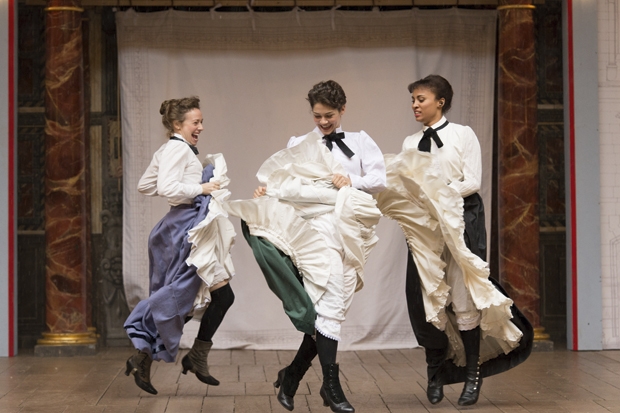More un-Shakespearean drama at London’s leading Shakespeare venue. The Globe has pushed the Bard off stage to make way for Blue Stockings, by Jessica Swale, which portrays the lives of female students at Girton College, Cambridge, in the 1890s. The script, which veers between weepy romcom and manipulative satire, sets out to elicit a collective gasp of outrage at the sexist piggery of the last century but one. To achieve this Swale has to rely on several fabrications. First, that intelligent women are rare. (Really?) Second, that men seldom meet intelligent women. (Surely they mingle all the time.) Third, that men find intelligent women threatening, tricky and outlandish. (In fact, men find them attractive, stimulating and fun.)
That Swale defames men is perhaps less surprising than that she has to defame women as well in order to make the anti-male libel stick. She shows gangs of chortling Cambridge chaps tiptoeing around the Girton gels like Taleban recruits exploring the Bunny Club. These foppish, goofy male bumpkins open their mouths only to blurt out formulaic chauvinism. ‘You want to be a scientist?’ scoffs one. ‘But you’re a woman.’ The play’s top bigot is a wasp-eyed throwback, Dr Maudsley, who sports an Amish beard to emphasise his Stone Age values. He lectures the gels on the subject of hysteria. ‘The overexertion of a woman’s brain at the expense of other vital organs may lead to atrophy, mania, or worse, to her being incapacitated as a mother.’
Many spectators yelled and hissed at this speech, and at the doc’s other misguided utterances, and did so with a degree of relish that seemed rather dispiriting. The play expects us to get our kicks by castigating the Victorians for being Victorians. This beguiling impulse — to censure people for being the people they happen to be — is the quintessence of prejudice. I found it strange to find the lynch-mob mentality expressed so openly in a public theatre but I dare say the hissers and booers — who probably regard themselves as enlightened souls — find few opportunities to inflict their malevolence on living targets, so they take their prejudices out on their ancestors instead.
The script is occasionally funny and it contains some interesting thoughts about astronomy, which is evidently Swale’s favourite discipline. But when she tries to hammer home her Big Point about victimised womenfolk, she becomes laborious and earnest. One of the Girton gels, a Belfast pauper, is forced to ditch her degree in order to take care of her family following a bereavement. Her thick, angry brother, Billy, stomps into Girton to deliver the bad news. ‘Just my coming here’s cost me my job,’ he says, twisting a tear-stained hanky between his sooty fingers. ‘I tried to send word but I couldn’t find anyone to write me a letter.’ Amazing, isn’t it? No one in Ulster could use a fountain pen or send a telegram so poor old Billy had to bankrupt himself paying his fare from Belfast to Cambridge just to tell his sister he’d bankrupted himself.
By coincidence, Thark by Ben Travers (b. 1886) takes us into a society of similar vintage. But Travers’s world is diametrically opposed to Swale’s. The woman have all the authority and the men are empty-headed buffoons entirely in thrall to their appetites. Sir Hector Benbow, a posh old twerp, wants to seduce an attractive young shop girl beneath the nose of his wife, Lady Benbow, who has the sleuthing instincts of Miss Marple and the moral outlook of Clytemnestra. Chaos ensues. After much lustful capering about, the action shifts to Norfolk where Sir Hector keeps a haunted mansion that he wants to sell to Mrs Frush, a shrewd Cockney businesswoman. Further chaos ensues. Travers’s writing takes some getting used to. The script consists of brief frenetic scenes, which teem with the low-level clutter of slapstick: cross-talk, verbal blunders, false identities, misinterpreted embraces, and so on. The effect is brittle, hurried and repetitive. At times, you long for a character to give a speech lasting longer than ten seconds. The breakneck pace is achieved at the expense of character: everyone is as shallow as a birdbath. And the men are drawn with far more sympathy than the obdurate and truculent women.
And yet the show succeeds thanks to a trio of great performances. A handsome, shiny-faced youngster, James Dutton, shows a lot of promise as an upper-class idler named Ronny Gamble. Andrew Jarvis, with an old rocker’s mane of snowy hair, is superbly creepy as the ghostly butler. And best of all is Clive Francis, the script’s adaptor, who bustles about as Sir Hector with oodles of warmth and charm. Farce is the most perishable of theatrical genres. And while this show is ‘amusing’ rather than ‘uproarious’, the miracle is that it’s funny at all.
 Lloyd Evans
Lloyd Evans
Blue Stockings defames women in order to defame men; Thark succeeds thanks to a trio of great perfomances

issue 07 September 2013







Comments